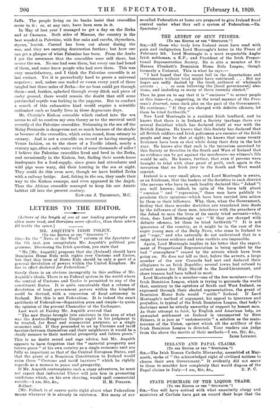LETTERS TO THE EDITOR.
[Letters of the length of one of our leading paragraphs are often more read, and therefore more effective, than those which fill treble the space.]
MR. ASQUITH'S IRISH POLICY.
[To THE EDITOR OF THE " SPECTATOR."] SIR,—In the " News of the Week " column of the Spectator of the 7th inst. you recapitulate Mr. Asquith's political pro- gramme. Discussing the Irish question, you state that
" He [Mr. Asquith] proposes that she [Ireland] should have Dominion Home Rule with rights over Customs and Excise, but that this form of Home Rule should be only a part of a general devolution of powers within the United Kingdom. He has in effect declared for Federalism."
Surely there is an obvious incongruity in this outline of Mr. Asquith's ideals. There is no Federal system in the world where the control of Customs and Excise is permitted to any of the constituent States. It is quite conceivable that a scheme of devolution of local government powers within the kingdom could be devised, with a concession of fiscal autonomy to Ireland. But this is not Federalism. It is indeed the exact antithesis of Federalism—Separation pure and simple—to quote the opinion of the present Chancellor of the Exchequer.
Last week at Paisley Mr. Asquith averred that
" The new States brought into existence in the area of what was the Austro-Hungarian Empire ought in his judgment to he treated, for fiscal and commercial purposes, as a single economic unit. If they proceeded to set up Customs and tariff barriers between themselves and their neighbours it would be a steady menace to their material prosperity and future peace." This is no doubt sound and sage advice, but Mr. Asquith appears to have forgotten that the " material prosperity and future peace " of his own country as a single economic unit are fully as important as that of the Central European States, and that the grant of a Dominion Constitution to Ireland would raise those "Customs and tariff barriers" which he rightly regards as a menace to peace and prosperity.
If Mr. Asquith contemplates such a crazy adventure, he must not expect that industrial Ulster will join him in promoting conditions which, on his own showing, would spell commercial
[Mr. Pollock is of course quite right about what Federalism means wherever it is already in existence. But many of our so-called Federalists at home are prepared to give Ireland fiscal control under what they call a system of Federalism.—En. Spectator.]


































 Previous page
Previous page